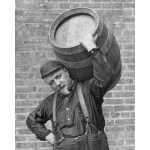[an error occurred while processing this directive]
Antique Beer Photos:

Dozens of prints available in a variety of sizes up to 40x50. |  |
|
|
By permission of the author, the following is reproduced from Will Anderson's Beer New England.
Keeping Up With The Joneses.
 "Keeping up with the Joneses" was not just an idle expression in turn-of-the-century New Hampshire brewing circles: it was a most difficult task indeed. Dominating Manchester was True Jones; dominating Portsmouth (and scores of other markets, too!) was Frank Jones. The two were brothers, part of a family of seven children born unto Mary and Thomas Jones of Barrington, a small town roughly fifteen miles west of Portsmouth. Frank was the older of the two . . . and it was he who would go on to far and away greater prominence. Little, in fact, is known about True Jones. He appears to have followed Frank (and several other siblings) to Portsmouth, from whence he made his way to the state's largest city,
Manchester. There he, in 1891, gained control of the Carney, Lynch & Company brewery. Changing the name to the True W. Jones Brewing Company, he became king of the Manchester brewing scene. But, then again, that was pretty easy: by the 1890s True W. Jones was the only game in town. He was the only brewer in Manchester. True passed away on October 2, 1899, but the brewery that bore his name continued on until New Hampshire went dry in 1917. "Keeping up with the Joneses" was not just an idle expression in turn-of-the-century New Hampshire brewing circles: it was a most difficult task indeed. Dominating Manchester was True Jones; dominating Portsmouth (and scores of other markets, too!) was Frank Jones. The two were brothers, part of a family of seven children born unto Mary and Thomas Jones of Barrington, a small town roughly fifteen miles west of Portsmouth. Frank was the older of the two . . . and it was he who would go on to far and away greater prominence. Little, in fact, is known about True Jones. He appears to have followed Frank (and several other siblings) to Portsmouth, from whence he made his way to the state's largest city,
Manchester. There he, in 1891, gained control of the Carney, Lynch & Company brewery. Changing the name to the True W. Jones Brewing Company, he became king of the Manchester brewing scene. But, then again, that was pretty easy: by the 1890s True W. Jones was the only game in town. He was the only brewer in Manchester. True passed away on October 2, 1899, but the brewery that bore his name continued on until New Hampshire went dry in 1917.
But if little is known about True Jones, lots is known about his older brother. Frank Jones was truly a giant among Granite Staters. Raymond A. Brighton, who chronicled the history of Portsmouth in his THEY CAME TO FISH, devoted an entire chapter to Frank, declaring that, while Portsmouth has had many, many notables in its three-hundred fifty plus years of existence, "none of them dominated their times as completely as did Frank Jones."
Born in 1832, Frank came to Portsmouth -- not to be a brewer, but to work as a tin peddler for his brother Hiram's hardware and stove business -- at age sixteen. Frank was much too ambitious, however, to merely peddle tin for very long. By 1858 he'd involved himself in the brewery of an Englishman named John Swindells. Within little more than a year he owned it. And once he owned it, Frank Jones set out to make his brewery the biggest and best around. He added a malt house in 1863, and a second one in 1879. A new brewhouse was constructed in 1870; in 1878 he added a cooperage department; what were generally believed to be the largest ale and porter storage cellars in the world were built in the early 1880s; and extensive bottling works were constructed in 1900.
What really made Frank Jones a Big Man Around Portsmouth, however, was his outside-of-brewing activities and interests. He was twice elected mayor of his adopted city; served New Hampshire as a two-term
Congressman; lost in a bid to become governor by a scant 2,000 votes in 1880; was president of the Boston & Maine Railroad, the Granite State Fire Insurance Company, the Portsmouth Fire Association, and the Portsmouth Shoe Company; and was proprietor of two still extant hotels, the Rockingham (in Portsmouth) and the rather colossal Wentworth-by-the-Sea (in nearby Newcastle).
To again quote Portsmouth historian Brighton: "The man was a legend in his own time."
|